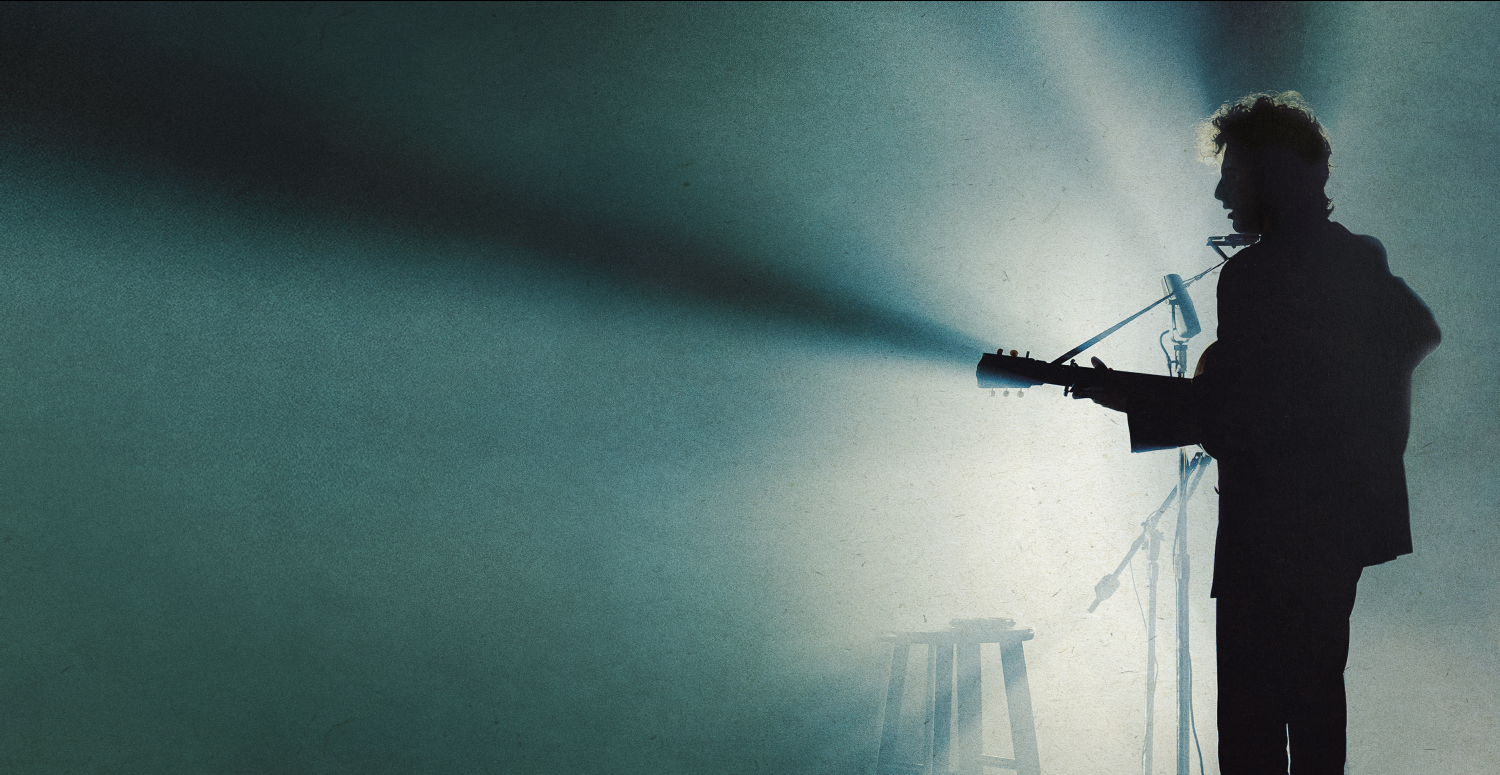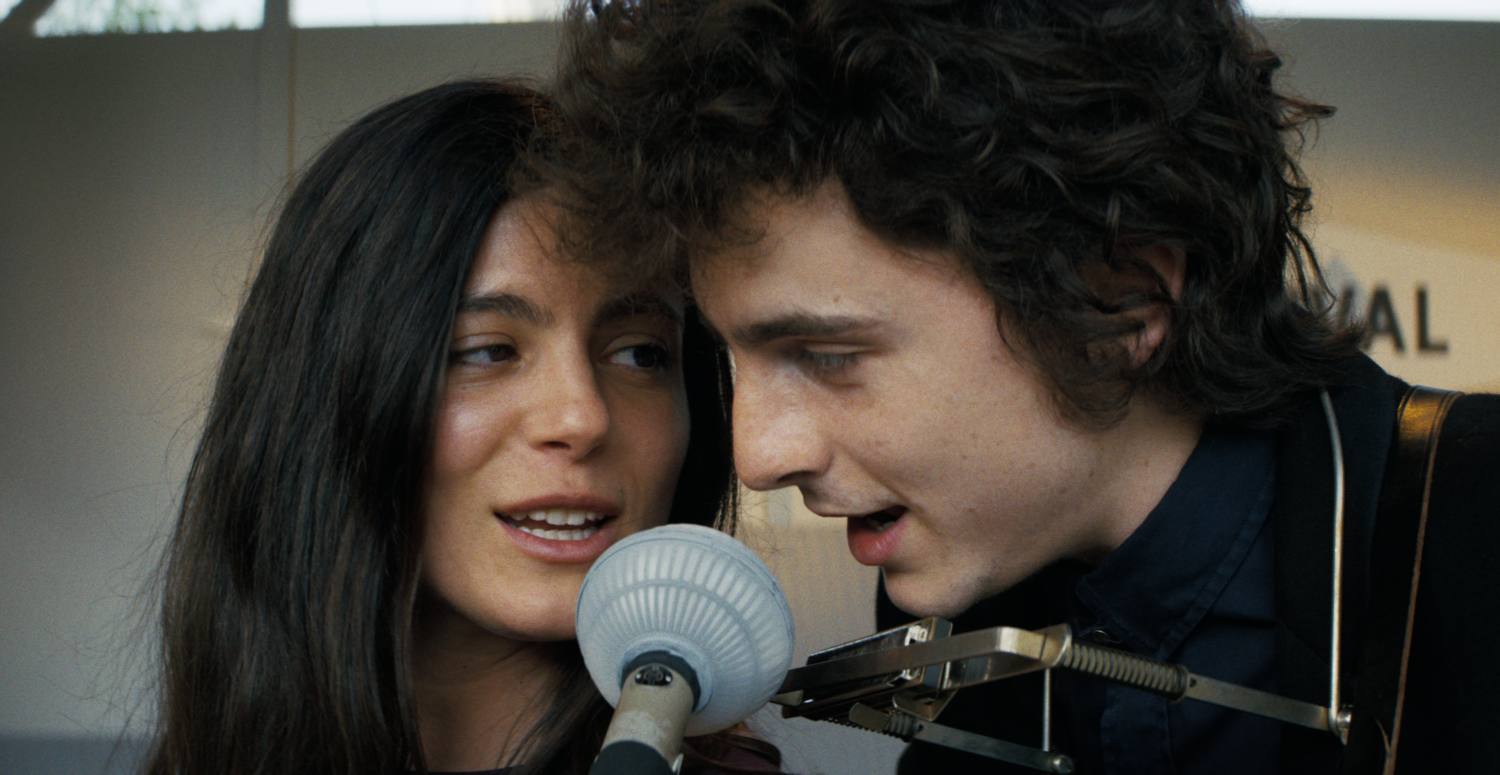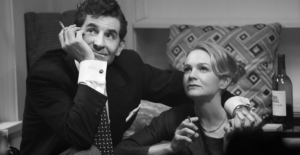Un Parfait Inconnu
A Complete Unknown
Best Actor in a Lead Role – SAG
Best Achievement for a Period Feature Film – SDSA
Best Achievement in Big Budget (Drama) – CSA
2024/2025

FR EN
Encore un énième biopic américain sur un musicien ? Oui dans la mesure où c’est un film de facture assez classique sur la star du folk aujourd’hui âgé de 83 ans. Mais pas complètement non plus puisque « Un Parfait Inconnu » choisit un véritable angle thématique et ne s’enfonce pas dans le récit biographique Wikipédia à rallonge. D’une part le film se limite à une période courte et spécifique bien qu’emblématique : de janvier 1961 à juillet 1965 où un énigmatique jeune homme de 19 ans débarque depuis son Minnesota natal avec sa guitare au Greenwich Village alors épicentre de la bohème et du folk américains. Mais aussi puisque conter la carrière de Bob Dylan, c’est aussi raconter un moment de l’histoire musicale (et pas que) américaine, parler de ses textes politiques et intimes, et bien évidemment de son passage à la guitare électrique : d’où l’histoire d’un parfait inconnu qui débarque à New-York et connaît une ascension fulgurante avant de redevenir un parfait inconnu pour ses (désormais très nombreux) fans.
Ce n’est donc pas le plus audacieux (Todd Haynes avait signé un biopic avec six acteurs/actrices pour l’interpréter) et le plus innovant des biopics, mais son choix narratif lui procure un véritable intérêt et la réalisation très soignée de James Mangold en fait un film réussi, très agréable et mélodieux. Il y a en effet de très nombreuses chansons tout du long, et pas que de Bob Dylan d’ailleurs, avec les rôles cruciaux de Peete Seeger et Joan Baez notamment. Jouant et chantant son rôle avec un rare mimétisme, Timothée Chalamet impressionne à nouveau en incarnant un Dylan mystérieux, nonchalant et pas toujours aimable. Bien que le timbre aiguisé et nasillard de Dylan ne soit pas exactement rendu, l’acteur disparaît progressivement dans son rôle pour lequel il a dû apprendre la guitare (tout comme Monica Barbaro et Edward Norton qui délivrent d’excellentes performances).

« Un Parfait Inconnu » se distingue du précédent biopic musical du réalisateur « Walk the Line » (sur le destin du chanteur country Johnny Cash, qui est également présent dans l’intrigue ici mais évidemment plutôt vu sous les yeux de Dylan) par son choix de ne pas chercher à éclaircir le mystère qui entoure la figure de Bob Dylan. Les explications du phénomène on ne les obtient pas, de sorte qu’on ne plonge pas véritablement en profondeur dans une étude de sa personnalité. Le film raconte ainsi autant Dylan lui-même que l’effet Dylan sur son public et son entourage comme le montrent les très nombreux regards qui se croisent et s’entrecroisent lors des concerts. C’est l’une des grandes forces du film, la force et l’émotion qu’il donne à ses personnages secondaires, tout aussi important dans l’intrigue que son protagoniste biographié.
Si le scénario suit certaines étapes inévitables (les rencontres décisives, les succès, les amis et amours – avec un triangle intéressant), il choisit un point de focale inattendu en la personne de Woody Guthrie – ce chantre libertaire des luttes sociales, et des travailleurs de la Grande Dépression atteint de la maladie de Huntington – qui devient la véritable boussole du film : de son influence dans le lancement de la carrière de Dylan à l’écart pris par l’élève vis-à-vis de son mentor. Et cet éloignement il s’opère lorsque le chanteur, refusant toutes les étiquettes, fit en 1965 le choix très controversé (mais qui aura des répercussions mondiales) de passer de l’acoustique à l’électrique. Ce geste fit en effet trembler la scène folk et fut pris comme une trahison par une partie du public bien qu’il ouvrît une nouvelle voie pour des auteurs-compositeurs comme Neill Young. Ce n’est donc pas un biopic exhaustif sur la vie de Robert Zimmerman mais plutôt un chapitre de la carrière de Bob Dylan qui se clôt lors de l’édition 1965 du Festival de Newport.
Raphaël Sallenave
Yet another American biopic about a musician? Yes, to the extent that it’s a fairly standard film about the folk legend, who’s now 83. But not entirely, either, since “A Complete Unknown” takes a true thematic approach and doesn’t fall into the trap of a drawn-out Wikipedia account. For one thing, the film is limited to a short, specific yet emblematic period: from January 1961 to July 1965, when an enigmatic 19-year-old arrived from his native Minnesota with his guitar in Greenwich Village, then the heart of American folk and bohemian music. But also, because telling the story of Bob Dylan’s career means telling the story of a moment in American musical (and not only) history, of his political and intimate lyrics, and of course of his move to the electric guitar: hence the story of a complete unknown who lands in New York and experiences a lightning rise to fame, before once again becoming a complete unknown to his (now very large) fan base.
It’s not the most daring (Todd Haynes previously directed a Dylan biopic featuring six actors/actresses) or the most groundbreaking of biopics, but the narrative choice makes for a genuinely interesting film, and James Mangold’s meticulous direction makes for an enjoyable, melodious and highly accomplished film. There are indeed plenty of songs throughout, and not just Bob Dylan’s, with Peete Seeger and Joan Baez playing key roles. Timothée Chalamet plays and sings his role with a rare degree of mimicry, impressing once again as a mysterious, nonchalant and not always lovable Dylan. Although Dylan’s sharp, nasal timbre is not exactly reproduced, the actor gradually fades into his role, for which he had to learn the guitar (as did Monica Barbaro and Edward Norton, who deliver outstanding performances).

“A Complete Unknown” differs from the director’s previous musical biopic “Walk the Line” (on the fate of country singer Johnny Cash, who is also featured in the plot here but obviously seen more through Dylan’s eyes) in its choice not to seek to shed light on the mystery surrounding the figure of Bob Dylan. We don’t get the explanations for the Dylan phenomenon, so we don’t delve too deeply into a study of his personality. The film is therefore as much about Dylan himself as it is about the Dylan effect on his audience and entourage, as illustrated by the many glances that cross and intertwine at the concerts. This is one of the film’s great strengths, the power and emotion it gives to its supporting characters, who are just as important to the plot as its biographed protagonist.
While the script follows certain unavoidable milestones (decisive encounters, successes, friends and lovers – with an interesting triangle), it chooses an unexpected focal point in the person of Woody Guthrie – that libertarian singer of social struggles, and of Depression-era workers suffering from Huntington’s disease – who becomes the film’s true compass: from his influence in launching Dylan’s career to the departure of the disciple from his mentor. And this distancing took place when, in 1965, the singer, refusing to be confined into a box, made the highly controversial choice (which was soon to have worldwide repercussions) of switching from acoustic to electric. This move rocked the folk scene and was seen as a betrayal by a lot of his fans, even though it opened up a new path for singer-songwriters such as Neill Young. So, this is not an exhaustive biopic of Robert Zimmerman’s life, but rather a chapter in Bob Dylan’s career that comes to a close at the 1965 Newport Festival.
Raphaël Sallenave

